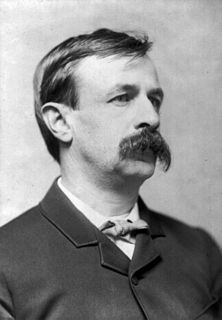Top 258 Benevolence Quotes & Sayings - Page 5
Explore popular Benevolence quotes.
Last updated on April 16, 2025.
Who are we really? Combinations of common chemicals that perform mechanical actions for a few years before crumbling back into the original components? Fresh new souls, drawn at random for some celestial cupboard where God keeps an unending supply?Or the same soul, immortal and eternal, refurbished and reused through endless lives, by that thrifty Housekeeper? In Her wisdom and benevolence She wipes off the memory slates, as part of the cleaning process, because if we could remember all the things we have experienced in earlier lives, we might object to risking it again.
Where the good begins.- Where the poor power of the eye can no longer see the evil impulse as such because it has become too subtle, man posits the realm of goodness; and the feeling that we have now entered the realm of goodness excites all those impulses which had been threatened and limited by the evil impulses, like the feeling of security, of comfort, of benevolence. Hence, the duller the eye, the more extensive the good. Hence the eternal cheerfulness of the common people and of children. Hence the gloominess and grief - akin to a bad conscience - of the great thinkers.
Though there is a benevolence due to all mankind, none can question but a superior degree of it is to be paid to a father, a wife, or child. In the same manner, though our love should reach to the whole species, a greater proportion of it should exert itself towards that community in which Providence has placed us. This is our proper sphere of action, the province allotted us for the exercise of our civil virtues, and in which alone we have opportunities of expressing our goodwill to mankind.
I longed that those who, I have reason to think, owe me ill will, might be eternally happy. It seemed refreshing to think of meeting them in heaven, how much soever they had injured me on earth: had no disposition to insist upon any confession from them, in order to reconciliation, and the exercise of love and kindness to them. Oh! it is an emblem of heaven itself, to love all the world with a love of kindness, forgiveness, and benevolence.
To be fond of learning is to draw close to wisdom. To practice with vigor is to draw close to benevolence. To know the sense of shame is to draw close to courage. He who knows these three things knows how to cultivate his own character. Knowing how to cultivate his own character, he knows how to govern other men. Knowing how to govern other men, he knows how to govern the world, its states, and its families.
I wish I could recall with clarity the impulse that compelled me to help bring this camp into being. I'd be pleased if I could announce a motive of lofty purpose. I've been accused of compassion, of altruism, of devotion to Christian, Hebrew, and Muslim ethic, but however desperate I am to claim ownership of a high ideal, I cannot. I wanted, I think, to acknowledge Luck; the chance of it, the benevolence of it in my life, and the brutality of it in the lives of others, made especially savage for children because they may not be allowed the good fortune of a lifetime to correct it.
Spies cannot be usefully employed without a certain intuitive sagacity; They cannot be properly managed without benevolence and straightforwardness; Without subtle ingenuity of mind, one cannot make certain of the truth of their reports; Be subtle! be subtle! and use your spies for every kind of warfare; If a secret piece of news is divulged by a spy before the time is ripe, he must be put to death together with the man to whom the secret was told.
... the United States, for generations, has sustained two parallel but opposed states of mind about military atrocities and human rights: one of U.S. benevolence, generally held by the public, and the other of ends-justify-the-means brutality sponsored by counterinsurgency specialists. Normally the specialists carry out their actions in remote locations with little notice in the national press. That allows the public to sustain its faith in a just America, while hard-nosed security and economic interests are still protected in secret.
I do not see why the axiom of Prudence should not be questioned, when it conflicts with present inclination, on a ground similar to that on which Egoists refuse to admit the axiom of Rational Benevolence. If the Utilitarian has to answer the question, 'Why should I sacrifice my own happiness for the greater happiness of another?' it must surely be admissible to ask the Egoist 'Why should I sacrifice a present pleasure for a greater one in the future? Why should I concern myself about my own future feelings any more than about the feelings of other persons?'
Though we think intrinsic desires tend to be pretty stable, we do not think they imply anything like the amount of predictability in behavior that traditional virtue ethics requires for someone to have a one-word-in-English character trait such as "benevolence". Other things being equal, a person with more of a desire for other people's wellbeing will do more for other people's wellbeing, but things are almost never equal.
How pitiable is it to reflect, that although you were so fully convinced of the benevolence of the Father of Mankind, and of his equal and impartial distribution of these rights and privileges, which he hath conferred upon them, that you should at the same time counteract his mercies, in detaining by fraud and violence so numerous a part of my brethren, under groaning captivity and cruel oppression, that you should at the same time be found guilty of that most criminal act, which you professedly detested in others, with respect to yourselves
Remember us in your prayers that we grow not weary in well doing. It is hard to work for years with pure motives, and all the time be looked upon by most of those to whom our lives are devoted as having some sinister object in view. Disinterested labor - benevolence - is so out of their line of thought, that many look upon us as having some ulterior object in view; but He who died for us, and Whom we ought to copy, did more for us than we can do for any one else. He endured the contradiction of sinners. We should have grace to follow in His steps.
People nowadays interchange gifts and favors out of friendship, but buying and selling is considered absolutely inconsistent with the mutual benevolence which should prevail between citizens and the sense of community of interest which supports our social system. According to our ideas, buying and selling is essentially anti-social in all its tendencies. It is an education in self-seeking at the expense of others, and no society whose citizens are trained in such a school can possibly rise above a very low grade of civilization
It is not indeed certain, that the most refined caution will find a proper time for bringing a man to the knowledge of his own failing, or the most zealous benevolence reconcile him to that judgment by which they are detected; but he who endeavours only the happiness of him whom he reproves will always have either the satisfaction of obtaining or deserving kindness; if he succeeds, he benefits his friend; and if he fails, he has at least the consciousness that he suffers for only doing well.
Republics demanded virtue. Monarchies could rely on coercion and "dazzling splendor" to suppress self-interest or factions; republics relied on the goodness of the people to put aside private interest for public good. The imperatives of virtue attached all sorts of desiderata to the republican citizen: simplicity, frugality, sobriety, simple manners, Christian benevolence, duty to the polity. Republics called on other virtues--spiritedness, courage--to protect the polity from external threats. Tyrants kept standing armies; republics relied on free yeomen, defending their own land.
It is difficult to find a reputable American historian who will acknowledge the crude fact that a Franklin Roosevelt, say, wanted to be President merely to wield power, to be famed and to be feared. To learn this simple fact one must wade through a sea of evasions: history as sociology, leaders as teachers, bland benevolence as a motive force, when, finally, power is an end to itself, and the instinctive urge to prevail the most important single human trait, the necessary force without which no city was built, no city destroyed.
A fight is going on inside me," said an old man to his son. "It is a terrible fight between two wolves. One wolf is evil. He is anger, envy, sorrow, regret, greed, arrogance, self-pity, guilt, resentment, inferiority, lies, false pride, superiority, and ego. The other wolf is good. he is joy, peace, love, hope, serenity, humility, kindness, benevolence, empathy, generosity, truth, compassion, and faith. The same fight is going on inside you." The son thought about it for a minute and then asked, "Which wolf will win?" The old man replied simply, "The one you feed.
Conservatives say the government can't end poverty by force, but they believe it can use force to make people moral. Liberals say government can't make people be moral, but they believe it can end poverty. Neither group attempts to explain why government is so clumsy and destructive in one area but a paragon of efficiency and benevolence in the other.

















